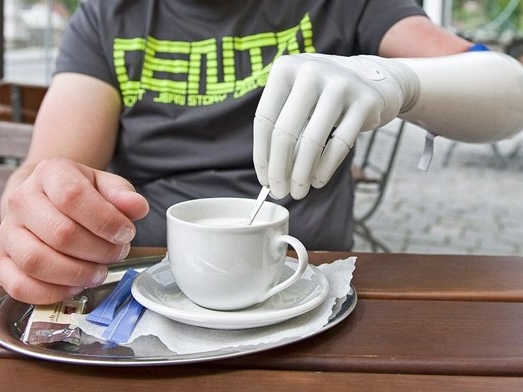Project completion: Research on innovative prosthetics
A camera in the prosthetic hand scans the environment and adjusts the grip precisely to the object the person wants to grasp. Via a sensory signal, the person then receives a feedback on how soft or hard the object is and how tight the grip on it is in order to be able to adjust it if necessary. An ITAS team has been working on the use of these intelligent prostheses for several years on behalf of the German Federal Ministry of Education and Research. In the project “INOPRO – Intelligent Orthotics and Prosthetics,” the ITAS researchers have collaborated with the Institute for Anthropomatics and Robotics (IAR) of KIT, the University of Freiburg, and Otto Bock HealthCare, the world market leader in the field of prosthetics, among others.
Reassessment of the human-machine relationship
“The next generation of prostheses could ensure a better quality of life and more social participation for people with amputations,” says Christopher Coenen, INOPRO project leader at ITAS. He and his research team have identified two challenges in this context. First, with regard to the relationship between humans and machines: This must be re-evaluated due to the invasive interfaces that will be used in the future, such as electrodes in the brain and partially autonomous prostheses, Coenen says. Second, with regard to the high costs of these technologies: For example, scarce resources in healthcare could mean that innovative prostheses would possibly only be accessible to a few people.
Focus on potential users
How these challenges could be evaluated and solved was explored by the ITAS team both in comprehensive literature research and in interviews with experts in healthcare and people who use prostheses. “The focus of our research was on potential users,” says Martina Baumann, project coordinator at ITAS. It is very important to continue to involve affected people in all phases and areas of research and development, says the expert for health technologies. To create a broader awareness of ethical, legal, and social aspects in the practice-oriented disciplines of prosthesis research, a further focus was on workshops and public events. (28.06.2022)
Further links and information:
- Project page INOPRO – Intelligent Orthotics and Prosthetics
- INOPRO in the BMBF program „Technik zum Menschen bringen“ (available only in German)
- Publications on INOPRO: Neurotech-Ethics: Suggestions for the Way Forward and Obstacles to Prosthetic Care - Legal and Ethical Aspects of Access to Upper and Lower Limb Prosthetics in Germany and the Improvement of Prosthetic Care from a Social Perspective


